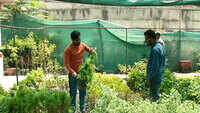
NEW DELHI: The Covid-19 pandemic is impacting people all across the world in drastic ways. In many countries, older people are facing the most threats and challenges at this time.
Although all age groups are at risk of contracting coronavirus, older people face significant risk of developing severe illness if they contract the disease due to physiological changes that come with ageing and potential underlying health conditions.
So what is inflammageing and its role in older people?
* In broader terms, inflammaging is defined as low-grade chronic systemic inflammation established during physiological aging.
* It can also be defined as an age-related increase in the levels of pro-inflammatory markers in blood and tissues.
* It is a strong risk factor for multiple diseases that are highly prevalent and frequent causes of disability in elderly individuals but are pathophysiologically uncorrelated.
* Most older individuals develop inflammageing, a condition characterized by elevated levels of blood inflammatory markers that carries high susceptibility to chronic morbidity, disability, frailty, and premature death.
Is inflammageing a factor in Covid-19 severe cases?
* According to a study, the increased severity and mortality of SARS-CoV-2 infections in older individuals may be related to inflammageing - an age-associated phenomenon of increased general inflammation.
* In this perspective, Arne Akbar and Derek Gilroy discussed the possibility as well as strategies to mitigate related effects. Inflammageing is thought to be caused, at least partially, by deterioration of aged cells (senescence) in tissues of the body that release inflammatory molecules.
* A growing number of studies show that excessive inflammation due to inflammageing combined with an aged immune system can inhibit overall immunity, which can also reduce vaccination efficacy in older people.
* According to Akbar and Gilroy's study, reducing the numbers of senescent cells with senolytic drugs or reducing inflammageing with anti-inflammatory drugs may be a beneficial strategy for improving Covid-19 outcomes in older patients.
Vaccine effect on older people with coronavirus
* The study also raises the question of whether vaccines can even be effective within these inflammatory environments.
* The search for an effective vaccine for Covid-19 has to consider the decreased vaccination efficacy in older subjects that may be associated with inflammageing.
* Therefore, the effective treatment of Covid-19 in older patients may require a combination of anti-inflammatory, anti-viral regimes to compliment vaccination against the virus, write Akbar and Gilroy.
Risk for severe illness increases with age
* According to the Centers for Disease Control and Prevention(CDC), as you get older, your risk for severe illness from Covid-19 increases. For example, people in their 50s are at higher risk for severe illness than people in their 40s.
* Similarly, people in their 60s or 70s are, in general, at higher risk for severe illness than people in their 50s.
* The greatest risk for severe illness from Covid-19 is among those aged 85 or older, says the CDC.
(With agency inputs)
Although all age groups are at risk of contracting coronavirus, older people face significant risk of developing severe illness if they contract the disease due to physiological changes that come with ageing and potential underlying health conditions.
So what is inflammageing and its role in older people?
* In broader terms, inflammaging is defined as low-grade chronic systemic inflammation established during physiological aging.
* It can also be defined as an age-related increase in the levels of pro-inflammatory markers in blood and tissues.
* It is a strong risk factor for multiple diseases that are highly prevalent and frequent causes of disability in elderly individuals but are pathophysiologically uncorrelated.
* Most older individuals develop inflammageing, a condition characterized by elevated levels of blood inflammatory markers that carries high susceptibility to chronic morbidity, disability, frailty, and premature death.
Is inflammageing a factor in Covid-19 severe cases?
* According to a study, the increased severity and mortality of SARS-CoV-2 infections in older individuals may be related to inflammageing - an age-associated phenomenon of increased general inflammation.
* In this perspective, Arne Akbar and Derek Gilroy discussed the possibility as well as strategies to mitigate related effects. Inflammageing is thought to be caused, at least partially, by deterioration of aged cells (senescence) in tissues of the body that release inflammatory molecules.
* A growing number of studies show that excessive inflammation due to inflammageing combined with an aged immune system can inhibit overall immunity, which can also reduce vaccination efficacy in older people.
* According to Akbar and Gilroy's study, reducing the numbers of senescent cells with senolytic drugs or reducing inflammageing with anti-inflammatory drugs may be a beneficial strategy for improving Covid-19 outcomes in older patients.
Vaccine effect on older people with coronavirus
* The study also raises the question of whether vaccines can even be effective within these inflammatory environments.
* The search for an effective vaccine for Covid-19 has to consider the decreased vaccination efficacy in older subjects that may be associated with inflammageing.
* Therefore, the effective treatment of Covid-19 in older patients may require a combination of anti-inflammatory, anti-viral regimes to compliment vaccination against the virus, write Akbar and Gilroy.
Risk for severe illness increases with age
* According to the Centers for Disease Control and Prevention(CDC), as you get older, your risk for severe illness from Covid-19 increases. For example, people in their 50s are at higher risk for severe illness than people in their 40s.
* Similarly, people in their 60s or 70s are, in general, at higher risk for severe illness than people in their 50s.
* The greatest risk for severe illness from Covid-19 is among those aged 85 or older, says the CDC.
(With agency inputs)
Download
The Times of India News App for Latest India News

Coronavirus outbreak
Trending Topics
LATEST VIDEOS
India
 Congress will be reduced to a party that only tweets: Prakash Javadekar
Congress will be reduced to a party that only tweets: Prakash Javadekar  COVID -19: ‘22.86% people affected in Delhi according to sero-prevalence study’
COVID -19: ‘22.86% people affected in Delhi according to sero-prevalence study’  Amarnath Yatra cancelled due to Covid-19 pandemic
Amarnath Yatra cancelled due to Covid-19 pandemic  Lawyer of Rajiv Gandhi’s killer demands her prison transfer over suicide attempt
Lawyer of Rajiv Gandhi’s killer demands her prison transfer over suicide attempt  Srinagar residents fulfilling gardening hobby during extended lockdown
Srinagar residents fulfilling gardening hobby during extended lockdown  Coal scam: CBI writes to Jharkhand govt, seeks sanction to prosecute former CM Madhu Koda
Coal scam: CBI writes to Jharkhand govt, seeks sanction to prosecute former CM Madhu Koda
More from TOI
Navbharat Times
Featured Today in Travel
Quick Links
Coronavirus in MumbaiCoronavirus in KolkataCoronavirus in HyderabadCoronavirus in DelhiCoronavirus in BangaloreCoronavirus symptomsCoronavirus in IndiaWhat is CoronavirusCoronavirus NewsSolar EclipseNPRWhat is NRCCAB BillCAB and NRCRTI BillPodcast newsLok SabhaShiv SenaYSRCPCongressBJP newsUIDAIIndian ArmyISRO newsSupreme Court
Get the app



